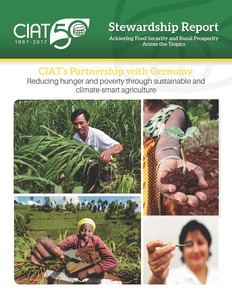Mission
To reduce hunger and poverty, and improve human nutrition in the tropics through research aimed at increasing the eco-efficiency of agriculture.
People
CIAT’s staff includes about 200 scientists. Supported by a wide array of donors, the Center collaborates with hundreds of partners to conduct high-quality research and translate the results into development impact. A Board of Trustees provides oversight of CIAT’s research and financial management.
Values
- Shared organizational ethic
- We respect each other, our partners, and the people who benefit from our work. We act with honesty, integrity, transparency, and environmental responsibility in all of our joint endeavors.
- Learning through partnerships
- We work efficiently and pragmatically together and with partners. Considering our diversity to be a key asset, we adapt readily to change and strive to improve our performance through continuous learning.
- Innovation for impact
- We develop innovative solutions to important challenges in tropical agriculture, resulting in major benefits for the people who support, participate in, and profit from our work.
Members:
Resources
Displaying 131 - 135 of 958Geographic overlaps between priority areas for forest carbon storage efforts and those for delivering peacebuilding programs: implications for policy design
Of the countries considering national-level policies for incentivizing reductions in forest-based greenhouse gas emissions (REDD+), some 25 are experiencing (or are emerging from) armed-conflicts. It has been hypothesized that the outcomes of the interactions between carbon-storage and peacebuilding efforts could result in either improved or worsened forest conservation and likewise increased or decreased conflict. Hence, for this study we explore potential interactions between forest carbon-storage and peacebuilding efforts, with Colombia as a case study.
CIAT’s Partnership with Germany: Reducing hunger and poverty through sustainable and climate-smart agriculture
CIAT in Kenya: Science for Impact
The International Center for Tropical Agriculture (CIAT), in collaboration with our national research partners, has been working in Kenya for the last 30 years. Our cutting-edge science helps policy makers, private sector, scientists, civil society, and farmers respond to the most pressing challenges of our time.
Learning from REDD+: a response to Fletcher et al.
Although REDD+ is approaching its 10th anniversary, major impacts in terms of reduced forest loss are hard to document. Conservation practitioners and scholars are therefore increasingly asking why REDD+ has not delivered more tangible results. A recent Comment in Conservation Biology by Fletcher et al. (2016) addresses this question. We agree with Fletcher et al. that REDD+ has been hyped in some circles, which has created unrealistic expectations among policy makers and forest dwellers alike. Yet, we argue that Fletcher et al.




